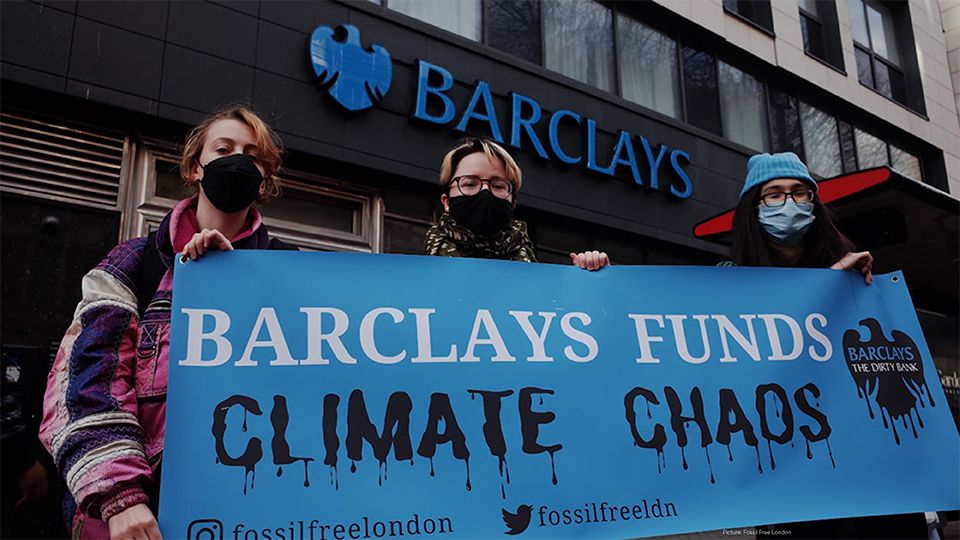Barclays has been warned it will face further shareholder action after failing to update its oil and gas policy and align this with its net-zero goals for the third year in a row.
Although the bank, which reported profits of £7bn in a trading update on 15 February, has committed to pulling financing from new oil sands exploration, production, or processing from July, and will also restrict finance to companies that generate more than 10% of their revenues from these activities, ShareAction and other non-profit groups have called for the bank to take more action as “nearly every major UK bank has done” to limit global warming to 1.5C.
Jeanne Martin, head of banking programme at ShareAction, said: “Barclays has taken an encouraging step forward today in tightening its restrictions around oil sands finance, after years of investors pushing for change on the issue.
“Disappointingly, despite not having published a new oil and gas policy for the last three years, the bank’s fracking policy remains unchanged and there is no mention of new oil and gas. This means Barclays continues to be out of step with current minimum standards of ambition within the industry.”
She urged Barclays to “step up” and update its oil and gas policy ahead of its 2023 AGM to meet science-based standards on climate, and flagged that 27 investors representing $1.4trn in assets wrote to Barclays demanding action just last week.
The letter called for a commitment to stop directly financing new oil and gas fields, and to also turn its attention to the companies behind these fields – indigenous activists from the US and Mexico visited Barclays teams in the UK in November to discuss the harmful effects of fracking on their communities and to ask them to stop financing these projects.
“The bank should be prepared to deal with further shareholder action to encourage Barclays to meaningfully align with its net-zero goal,” Martin said.
Joanna Warrington, spokesperson for Fossil Free London, added: “Campaigns are growing louder and louder every day. Barclays is covering its ears to the warnings, but the damage of their funding will soon be visible to everyone. Floods, famine and global misery will be the sure result of this lack of action on oil and gas.
“It’s way beyond time for Barclays to dump big oil. We demand an end to the funding of oil and gas. The people cannot afford it; not financially and not for our survival.”
Left behind
Barclays has also been criticised for “swimming against the tide of progress” as other major banks update their fossil fuel financing commitments. In December, HSBC announced its plans to stop financing new oil and gas fields as part of its net-zero strategy in which it committed to decarbonising the business by 2050. At the time, other banks including Barclays were urged to follow suit.
Beau O’Sullivan, senior strategist for the Bank on our Future campaign, commented: “Barclays has failed to do what nearly every major UK bank has done, which is start the process of ending financing for new oil and gas. As regulation clamps down on fossil fuel use and the world moves towards cleaner energy sources, Barclays is swimming against the tide of progress well behind its peers. As a result of this perverse omission, Europe’s largest fossil fuel funding bank is now firmly in the crosshairs of a growing movement of campaigners.”
Meanwhile, Tony Burdon, CEO at Make My Money Matter, also said customers could take action against the bank as well as shareholders: “By continuing on this path, Barclays is ignoring the science and disregarding its customers. Because any strategy which does not include restrictions on financing for new oil and gas represents a failure of leadership, ambition, and action. We expect this approach will lead to Barclays customers voting with their feet and moving to a bank which isn’t financing climate destruction.”
Windfall tax
Barclays’ pre-tax profits of £7bn for 2022, a figure that disappointed the market and prompted an almost 10% share price drop in early trading, prompted further calls for windfall tax on banks.
Fran Boait, executive director at Positive Money, said: “Let’s be clear: these profits were taken directly from the pockets of struggling households and businesses because of the Bank of England’s interest rate rises.
“Banks aren’t even passing these higher rates on to savers, they’re hoarding their unearned billions in a bout of greed reminiscent of the last financial crash.
“The case for a windfall tax on excess bank profits has never been stronger. It’s time the government stood up to the finance lobby in parliament, and handed that money back to the families it was taken from.”








